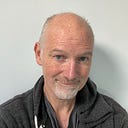>>[There is something] biologically unique about the way our brains operate>>
Personally, I don't think so. I think our brains work *at the biological level* just like other animals' brains, but we happen to have particular subsystems which confer this amazing recursive thing we call consciousness. Quite where the subsystems come together to yield this isn't yet clear, but we seem to need memory plus recursion. Is a dog conscious? Yes, in the moment, but not much further beyond. There's nothing particularly special about the basic functions or chemistry of human brains; only their organisation.
>>A spectrum need not suggest a third option, as much as it identifies intersex as intersex.>>
A spectrum by definition requires more than two mutually exclusive options. 0 and 1 do not describe a spectrum. And, I'll repeat again, "intersex" is a misleading and outdated word, and the fact that you keep using it shows how much you wish it would apply to transgender people. It does not. Transgender people do not change sex on the biological definition. They do not shift sex on the biological definition - not by the tiniest amount. They are, in almost every single case, utterly normal examples of people with XY or XX sex chromosomes, but they wish they'd been born with the other, utterly normal, configuration.
People with DSDs are one sex or the other. They are not an archetype for trans identity and people with DSDs do not, in pretty much every instance I've interacted with them, want to be identified as trans.
